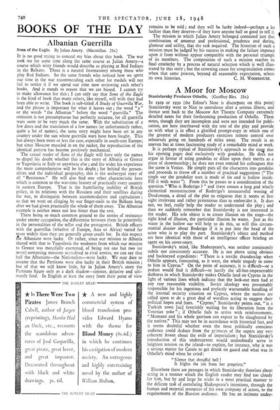BOOKS OF THE DAY
Albanian Guerrilla
Sons of the Eagle. By Julian Amery. (Macmillan. 21s.)
IT is no good trying to conceal my bias about this book. The war took me for some time along the same course as Julian Amery—a course which witty friends would describe as playing at Red Indians in the Balkans. There is a natural freemasonry among those who play Red Indians. So the same friends who noticed how we spent our time in the war recommending each other for medals will not fail to notice it if we spend our time now reviewing each other's books. And it stands to reason that we are biased. I cannot try to make allowance for this ; I can only say that Sons of the Eagle is the kind of book that many others, like myself, will wish they had been able to write. The book is sub-titled A Study of Guerrilla War, and the phrase is important for what it leaves out ; the word "a " or the words " the Albanian " before the word " guerrilla." The omission is not presumptuous but perfectly accurate, for all guerrilla wars seem to be very much the same. With the substitution of a few dates and the translation of a few names (or unfortunately rather, quite a lot of names), the same story might have been set in any country under the sun where guerrilla wars have been fought. This has always been more or less the case, especially in south-east Europe; but since Moscow muscled in on the racket, the reproduction of the identical pattern has become positively mechanical.
The casual reader of Sons of the Eagle will have only the names to dispel his doubt whether this is the story of Albania or Greece or Yugoslavia or Italy or anywhere else ; and the wider his experience the more comprehensive will be his doubt ; for behind the person- alities and the individual geography, this is the archetypal story of all " Resistance." He will also find one other characteristic here which is common to the war-time history of practically every country in eastern Europe. That is the humiliating inability of British policy, in its relations with the Russians and their satellites during the war, to distinguish between accommodation and capitulation ; so that we went on clinging by our finger-nails to the Balkans long after we had given practically the whole of them away. The Albanian example is neither more nor less bitter than the rest.
There being so much common ground to the stories of resistance under enemy occupation, the differentiae between them lie principally in the personalities of the teller and the protagonist. British officers with the guerrillas (whether of Europe, Asia or Africa) varied far more widely than they are generally given credit for. In this respect t!ie Albanians were lucky. Or rather, since our mission to Albania shared with that to Yugoslavia the weakness from which our mission to Greece was mercifully exempted, of being not one but two (or more) competing missions accredited to rival armies, we can say that half the Albanians—the Nationalists—were lucky. We may dare to assume that the Partisans were also lucky in their British mission ; but of that we still know little, for in Julian Amery's story the Partisans figure only as a dark shadow—sinister, delusive and ulti- mately fatal. In English at least the story from their point of view
remains to be told ; and they will be lucky indeed—perhaps a lot luckier than they deserve—if they have anyone half so good to tell it.
The mission to which Julian Amery belonged contained just that combination of amateur and professional, prudence and daring, glamour and utility, that the task required. The historian of such a mission must be judged-by his success in making the failure imposed upon it from without appear compatible with the personal triumph of its members. The composition of such a mission reaches its final entelechy by a process of natural selection which is well illus- trated by this story ; but the crowning cause for congratulation comes when that same process, beyond all reasonable expectation, selects


































 Previous page
Previous page